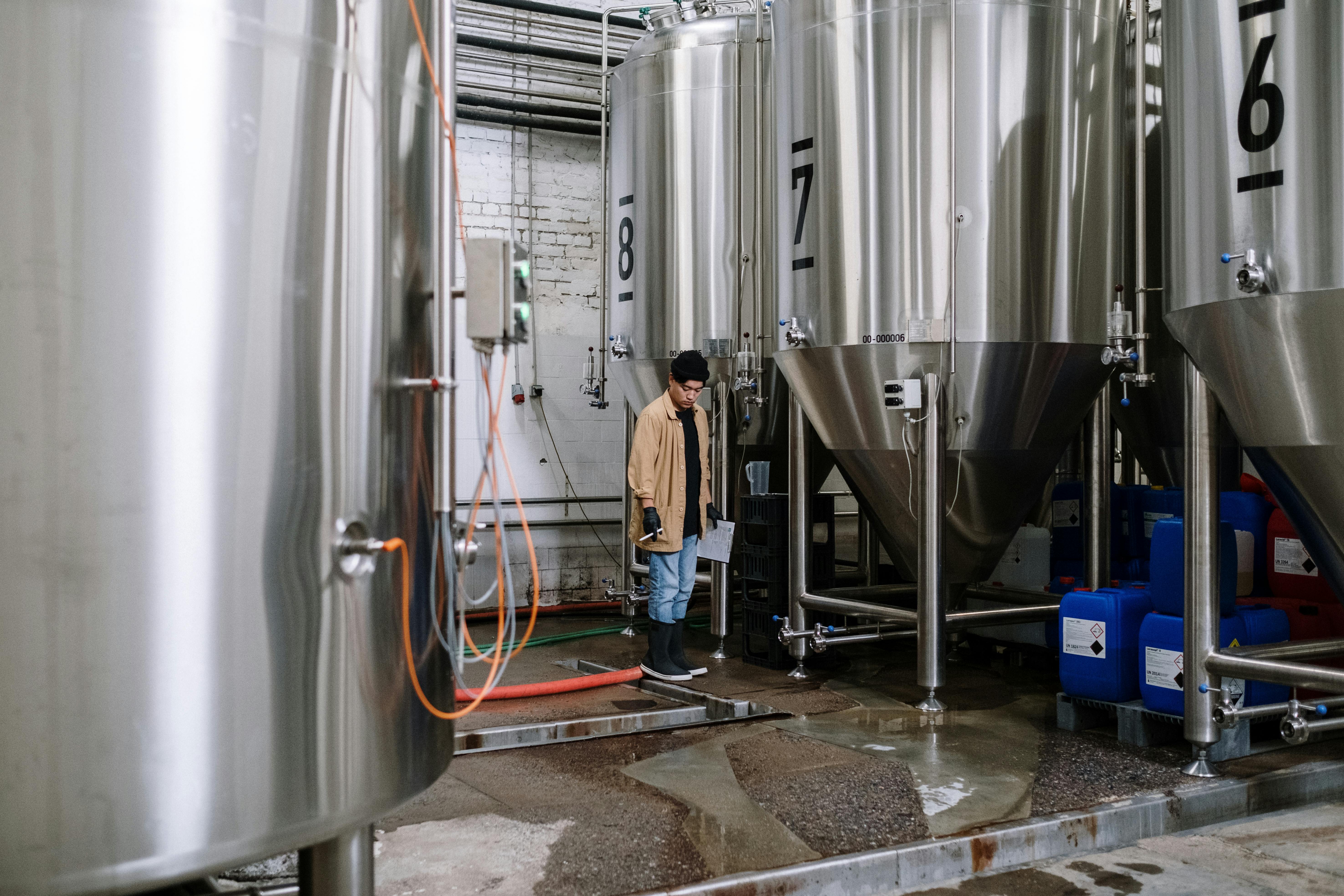Fermentation and distillation are two different processes used in the production of alcoholic beverages. Both processes involve the conversion of a sugar source into an alcoholic product, but they differ in the way that this conversion takes place. Fermentation involves the use of yeast to convert sugars into alcohol, while distillation is a process that uses heat to separate and concentrate the alcohol from other components. Each process has its own advantages and disadvantages, so it’s important to understand both before deciding which one to use for your production needs.Fermentation is a metabolic process that converts sugar to acids, gases, or alcohol. It occurs in yeast and bacteria, as well as in oxygen-starved muscle cells, as in the case of lactic acid fermentation. It is also used to produce wines, beers, and other alcoholic beverages from fruits and grains. Fermentation also yields many important enzymes and vitamins that are necessary for human nutrition.
What Is Distillation?
Distillation is a process used to separate and purify liquids based on their different boiling points. The process involves heating a mixture of liquids, vaporizing them, and then cooling the resulting vapor so that it condenses back into liquid form. This process can be used to separate two or more components from a single liquid or mixture of liquids. In addition, it can also be used to purify a single liquid by removing undesirable impurities. The distillation process is widely used in many industries such as petrochemicals, food processing, and water treatment.
The basic principle behind distillation is the difference in boiling points between the components of the mixture being distilled. When heated, each component will vaporize at its own unique temperature. By carefully controlling the temperature during distillation, it is possible to isolate individual components from the mixture. As the vapors cool and condense back into liquid form, they are collected separately from one another.
In addition to separating components based on their boiling points, distillation can also be used to purify liquids by removing impurities. The impurities present in a liquid will usually have
Fermentation and Distillation
Fermentation and distillation are two processes used in the production of alcoholic beverages. The main difference between fermentation and distillation is that fermentation produces a lower alcohol content than distillation. Fermentation is the process of converting sugar to alcohol, while distillation is the process of separating alcohol from water.
During fermentation, yeast is added to a mixture of sugars in order to produce alcohol. This process takes place over several days or weeks. During this time, the yeast consumes the sugars and converts it to alcohol. The resulting liquid contains between 4-7% alcohol by volume (ABV).
Distillation is the process of separating the alcohol from water using heat. This involves boiling the liquid and collecting the vapors which contain higher levels of alcohol than what was produced during fermentation. These vapors are then condensed back into liquid form, resulting in a much higher ABV (usually around 40-50%).
Although both processes produce alcoholic beverages, fermentation results in a lower ABV than distillation does. Additionally, distillation requires more time and effort than fermentation does as it requires additional equipment such as stills or alembics to complete the process
What is Fermentation?
Fermentation is a metabolic process in which microorganisms such as yeast or bacteria convert sugars into alcohol or acids. It is also known as anaerobic respiration, since it takes place in the absence of oxygen. This process is used to make many foods and beverages, including beer, wine, cheese, yogurt, bread, kimchi, and sauerkraut. It can also be used to produce biofuels and other industrial products. Fermentation has been used by humans for millennia to produce food and drink.
How Does Fermentation Work?
Fermentation occurs when microorganisms break down complex molecules into simpler compounds. During this process, the microorganisms use energy from the breakdown of molecules to generate ATP (adenosine triphosphate), which they use for their own growth and reproduction. The end products of fermentation are usually alcohols or acids, depending on the type of microorganism involved.
Types of Fermentation Processes
There are several types of fermentation processes that can be used
Distillation Process
Distillation is a process of separating the components or substances from a liquid mixture by using selective boiling and condensation. Distillation is a common laboratory process used to purify liquids. It works by boiling the mixture and then condensing the vapor into a separate container, leaving most of the non-volatile materials behind. The condensed vapor typically contains only the more volatile components of the original mixture.
The distillation process begins by heating an original mixture containing two or more components with different boiling points. As it is heated, some of the components in the mixture will vaporize while others will remain in their liquid form. This vapor is then collected and cooled, causing it to condense into liquid form again. The resulting condensed liquid contains only those substances which were originally volatile enough to be vaporized during heating.
The distillation process can be used for many different types of mixtures such as essential oils, alcoholic beverages, and even seawater. By carefully controlling the temperature and pressure of the system, it is possible to separate out specific components from a mix with precision and accuracy. In addition to separating substances

Advantages of Fermentation
Fermentation is an age-old process that has many advantages. It is a natural process that can be used to preserve food, produce alcoholic beverages, and improve the flavor and health benefits of food. Fermentation also helps to increase the shelf life of foods by preventing spoilage due to oxidation and enzymatic reactions. Additionally, fermentation can help reduce the risk of foodborne illnesses by eliminating or reducing harmful bacteria from food.
The biggest advantage of fermentation is that it does not require any additional chemicals or preservatives to be added to the food. This makes it a much healthier option than many other methods of preserving food. Also, fermentation can help enhance flavors in certain foods such as cheese, yogurt, beer, wine, and pickled vegetables. This makes it a great way to add variety and flavor to meals without having to use artificial ingredients or additives.
Another benefit of fermentation is that it can help preserve certain vitamins and minerals in foods that might otherwise be lost during traditional cooking processes. For example, lactic acid fermentation helps maintain the B vitamins present in vegetables while alcohol fermentation preserves antioxidants found in fruits and grains. Fermentation also
Advantages of Distillation
Distillation is a process used to separate and purify a liquid through evaporation and condensation. This process has many advantages, which is why it has been used for centuries. It can be used to separate volatile liquids, such as alcohol, from water or other solvents. It can also be used to separate mixtures of different compounds based on their boiling points. Distillation also provides a way to purify liquids that have been contaminated with solid particles or impurities.
One of the biggest advantages of distillation is its ability to produce high-purity products in a relatively short amount of time. This makes it an ideal method for industrial processes where large amounts of product must be produced quickly and with minimal waste. Additionally, distillation allows for the production of products that are not available in nature. For example, essential oils are created through distillation by extracting compounds from plants that do not naturally occur in their pure form.
Another advantage is that distillation does not require any additional chemicals or solvents to be added to the mixture being separated, making it a
Advantages of Fermentation
Fermentation is a process that has been used in various industries for centuries. It has many advantages, such as producing more efficient products with fewer inputs, creating a more consistent product, and allowing for easier storage and transport. The process of fermentation also helps reduce spoilage, making it easier to preserve foods and beverages for longer periods of time. Additionally, fermentation can also be used to develop unique flavors and textures in food products. Finally, fermentation can be used to create fuel sources that are renewable and cost-effective.
Disadvantages of Fermentation
Despite its many benefits, the process of fermentation does come with some disadvantages. For one, it requires specialized equipment in order to achieve the desired results. Additionally, fermentation can produce off-flavors or off-odors if not properly monitored or controlled. Furthermore, some types of fermentation require specific temperatures and pH levels to achieve optimal results. Finally, the process can be time-consuming and labor intensive depending on the type being performed.

Conclusion
Fermentation and distillation are two very different processes, each with its own distinct set of characteristics. Fermentation is a biochemical process that uses microorganisms to convert carbohydrates into alcohols or acids, while distillation is a physical process that separates liquids from solids or other liquids. The end products of fermentation and distillation also differ significantly: fermentation yields beer, wine, and other alcoholic beverages, while distillation yields essential oils, fuel alcohols, and other more concentrated forms of alcohol.
Ultimately, the differences between fermentation and distillation are quite clear: they have different processes, end products, and applications. While the two processes are related in some ways – they both involve the conversion of carbohydrates into something else – they are ultimately quite distinct. Understanding these differences will help ensure that you’re able to make the most out of each process for your desired purposes.

